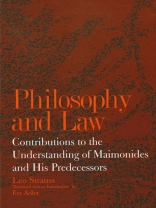A groundbreaking study of the political philosophy of Maimonides and his Islamic predecessors.
Leo Strauss’s Philosophy and Law contains a groundbreaking study of the political philosophy of Maimonides and his Islamic predecessors, and it offers an argument on behalf of that philosophy which is also a profound critique of modern philosophy. Here is an entirely new and complete English translation of Strauss’s work, which takes as its ideal the exacting standards of accuracy that Strauss himself emphasized in his own work. It includes a prefatory essay introducing the argument of each of the four sections of Philosophy and Law.
This is a fresh and challenging treatment of the perennial conflict between reason and revelation, or philosophy and religion. Strauss’s key contention in this book is that the most influential modern approaches to this conflict have run aground in ways that reflect their loss of key insights developed by the medieval philosophers of Islam and their Jewish pupils, especially Maimonides. Strauss challenges the modern view that scientific enlightenment must ultimately amount to atheism, and that therefore there can be no such thing as enlightened religion. Through a careful, original, and detailed treatment of central works of the medieval Islamic-Jewish tradition, especially Maimonides’ Guide of the Perplexed, Strauss aims to recover their key insights into this question.
قائمة المحتويات
Translator’s Introduction
Introduction
1. The Quarrel of the Ancients and the Moderns in the Philosophy of Judaism: Notes on Julius Guttmann, The Philosophy of Judaism
2. The Legal Foundation of Philosophy: The Commandment to Philosophize and the Freedom of Philosophizing
3. The Philosophic Foundation of the Law: Maimonides’s Doctrine of Prophecy and its Sources
Notes
Index
عن المؤلف
Leo Strauss was the Robert Maynard Hutchins Distinguished Service Professor in Political Science at the University of Chicago. Eve Adler is Professor of Classics at Middlebury College.












